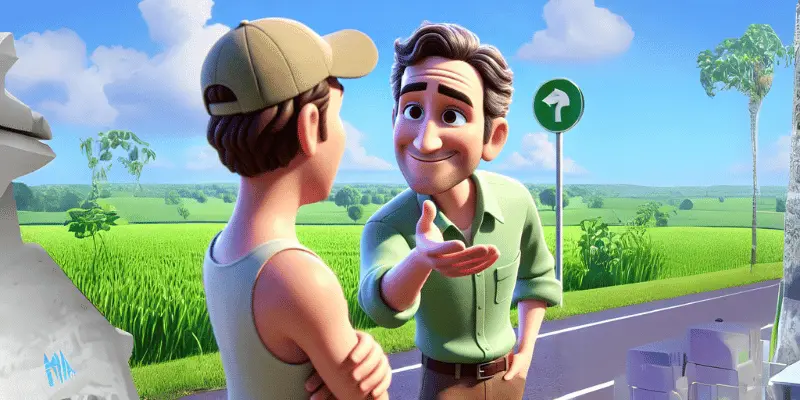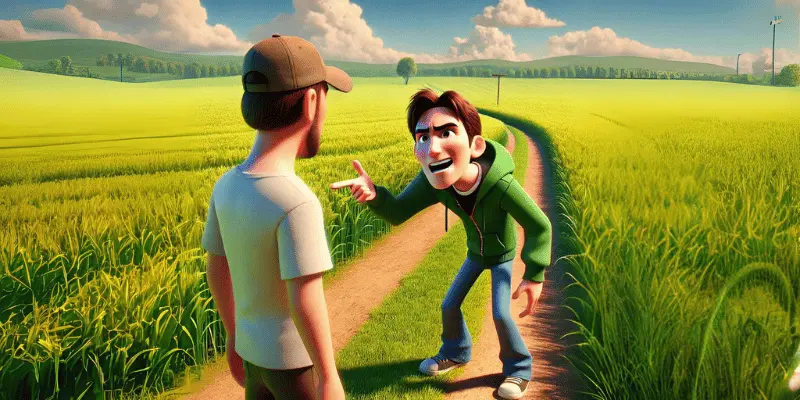To Respond or React – A Story of Anger and Patiance
Updated: 19 Oct, 2024
360
Dear readers, here is another story for you. To Respond or React is a moral story about two friends, Adam and Ben, who handle situations very differently.
This story has two versions:
- One is short for a quick read.
- 2nd is detailed and comprehensive.
In this tale, Adam is calm and thoughtful, but Ben tends to react impulsively.
Listen and Enjoy
Through their experiences, Ben learns the importance of responding with patience and understanding, rather than reacting in haste.
This story teaches a valuable lesson about how our responses can shape the outcomes of situations and foster better communication.
To Respond or React – Short Version – Let’s Read
Once upon a time, in a small town, there lived two friends, Adam and Ben.
Both were kind-hearted and hardworking, but they had very different ways of dealing with situations.
While Adam was calm and thoughtful, Ben was quick to react, often acting before thinking things through.

One day, the two friends were working in a field together when a stranger came by and asked for help.
The man had lost his way and needed directions.
Adam listened carefully to the stranger, asked him a few questions to understand the situation, and calmly gave him clear directions.
The man thanked Adam and went on his way.
More Moral Stories
Ben, however, was in a hurry and didn’t want to be interrupted.
When a second stranger approached and asked for directions, Ben snapped, “Just follow the road and figure it out yourself!”
The stranger, feeling confused and hurt, walked away in the wrong direction.
Later that evening, Adam and Ben sat by the fire, reflecting on their day.
Adam said, “You know, it’s not just about what we do, but how we handle situations. Sometimes, taking a moment to respond thoughtfully can change everything.”

Ben, realizing his mistake, nodded. “I guess I reacted without thinking. I let my frustration take over.”
Adam smiled and added, “Responding with patience and understanding helps others while reacting in anger or haste often leads to regret.”
Quote of the Day
Taking a moment to respond thoughtfully can build bridges, while reacting hastily often creates walls.
From that day on, Ben began to practice responding rather than reacting.
He learned that taking a moment to think before acting could lead to better outcomes and more peaceful interactions.
Moral of the Story
Responding thoughtfully brings understanding and peace while reacting impulsively can lead to misunderstandings and regret.
To Respond or React – Detailed Version
Adam and Ben lived in a small, peaceful town surrounded by green fields. The town was quiet and friendly, with only a few houses scattered along dirt roads.
People in the town knew each other well, and everyone helped one another when needed.
Adam and Ben had been best friends for years, but they were very different in how they approached life. Adam was calm and thoughtful.
He liked to take his time and think carefully before making decisions. Ben, on the other hand, was quick to act. He often rushed into things and didn’t always think before reacting.
Every day, Adam and Ben worked together in the fields.
They would wake up early in the morning, and after a simple breakfast, they headed to the fields to take care of the crops.
They spent long hours working, but their friendship made the hard work feel easier. Adam would often take his time and think through their work, making sure everything was done carefully.
Ben, however, would get impatient and try to finish quickly, sometimes without paying much attention to the details.
Even though they were different, they shared a strong bond, always looking out for each other. But when it came to handling problems or helping others, their differences became clear.
This would soon show when they met a stranger who needed help in the field.
The First Encounter (Adam’s Response)
One day, while Adam and Ben were working in the field, a stranger walked by. He looked a little lost and seemed like he needed help.
The man approached Adam and asked, “Excuse me, could you please tell me how to get to the nearby town?”
Adam stopped what he was doing and smiled. Instead of giving a quick answer, he took the time to listen carefully to the stranger.
He asked a few questions to understand exactly where the man wanted to go. Adam then thought for a moment and gave the man clear, simple directions.
The stranger was grateful. “Thank you so much! You’ve been very helpful,” he said with a smile. Adam nodded and wished him well.
The man thanked him again and walked away, feeling confident and happy with the directions he had received.
Adam didn’t rush. He took his time to make sure the stranger understood and left feeling good. His calm and thoughtful response made a big difference.
The stranger walked away happy, knowing exactly where to go.
The Second Encounter (Ben’s Reaction)
Later in the day, another stranger appeared. He was looking lost and asked Ben for directions, hoping to find his way.
But Ben, feeling impatient and in a hurry, didn’t want to stop and take the time to help.
Without thinking, he snapped at the stranger, saying, “Just follow the road and figure it out yourself!”
The stranger, feeling hurt and confused, didn’t know what to do. He walked away, heading in the wrong direction, unsure of which way to go.
Ben didn’t realize it at the time, but his quick reaction had made the situation worse, leaving the stranger in even more confusion.
While Adam had taken his time to respond calmly and kindly, Ben had reacted without thinking, causing a problem instead of helping.
The Evening Reflection
That evening, after a long day of work, Adam and Ben sat by the fire, resting and talking about the events of the day. As they sat there, Adam shared his thoughts with Ben.
“You know,” Adam said, “It’s not just about what we do, but how we handle things. Sometimes, taking a moment to respond thoughtfully can change everything.”
Ben listened quietly, realizing what had happened. He thought about the stranger he had turned away earlier and how his hasty reaction had made things worse.
“I guess I reacted too quickly,” Ben admitted. “I was in a hurry and didn’t stop to think about what I was saying. I let my frustration take over, and it wasn’t right.”
Adam smiled and nodded. “Responding with patience and understanding can really help others. Reacting without thinking often leads to regret.”
Ben now understood the lesson. He had learned that taking a moment to respond thoughtfully, instead of reacting right away, could make a big difference.
He was grateful for Adam’s calm and wise words.
The Lesson Learned
The next day, Adam shared his wisdom with Ben: “When we respond thoughtfully, we show kindness and understanding.
But when we react quickly and without thinking, it can hurt others and create problems.”
Ben nodded, realizing how true that was. “You’re right, Adam,” he said. “I don’t want to react in anger anymore.
I want to take a moment, think carefully, and respond with patience.”
From that day on, Ben worked hard to practice patience.
Whenever something unexpected happened or someone needed help, he took a deep breath, thought about the situation, and responded calmly.
Over time, he became much better at handling situations with care and understanding.
Ben learned that responding thoughtfully not only helped others, but it also made his life more peaceful and happy.
And whenever he faced a challenge, he remembered the lesson Adam had taught him about thinking before reacting.
Moral of the Story
The main lesson from this story is simple: Taking a moment to think before responding can help you build better relationships and understanding with others.
When you respond thoughtfully, you show that you care and respect the other person’s feelings.
On the other hand, reacting too quickly, especially in anger or frustration, can cause misunderstandings and hurt feelings.
Quote of the Day: “Taking a moment to respond thoughtfully can build bridges while reacting hastily often creates walls.”
So, remember to pause and think before you act. This will lead to more peaceful and happy interactions with the people around you.
What Kids Learn from This Story
From this story, your kids can learn some valuable lessons about how to behave when they face a challenging situation.
- Think Before You Act: Sometimes it’s better to take a moment to think and calm down before reacting. It helps you make better decisions and avoid regrets.
- Be Patient and Kind: Responding with patience and kindness can solve problems and make others feel respected and understood.
- Understand the Impact of Your Actions: How we respond to others can either help them or hurt them. It’s important to be mindful of how our words and actions affect those around us.
- Improve Relationships: When we respond thoughtfully, we build stronger, more trusting relationships with others.
- Learn from Mistakes: Just like Ben, we all make mistakes. What matters is that we recognize them and try to do better next time.
Follow-Up Questions For this Story
| Follow Up Questions |
|---|
|
Please Write Your Comments